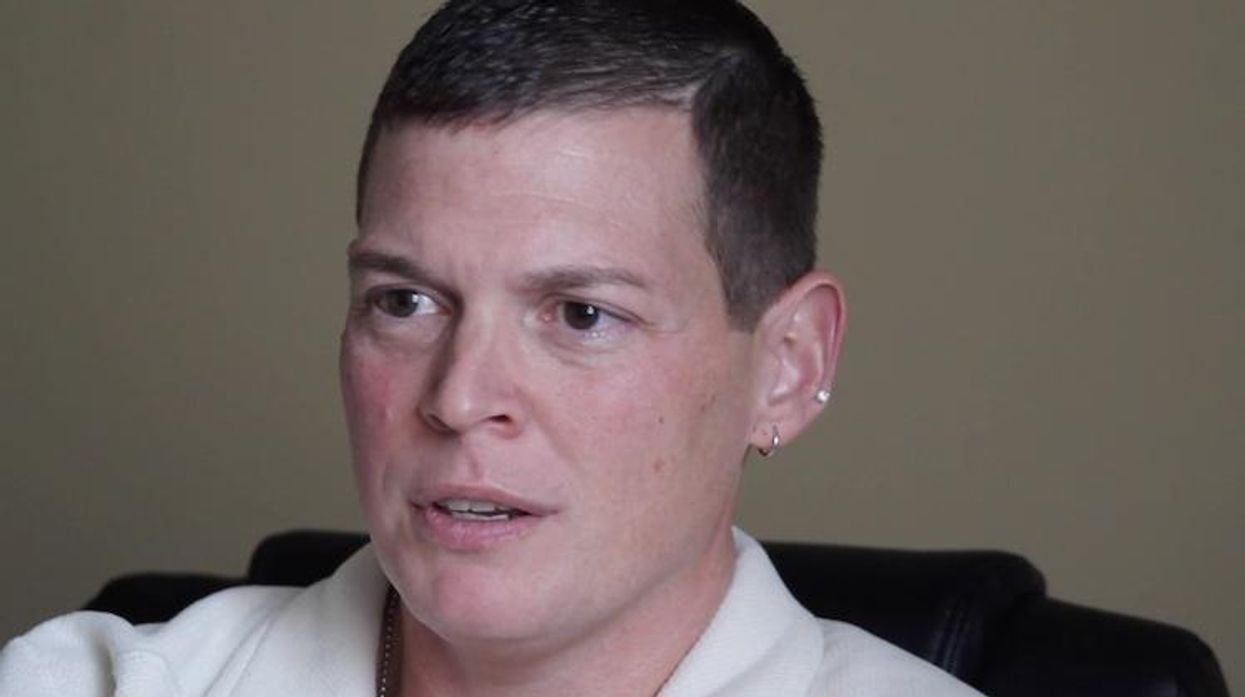A lesbian member of the West Virginia Air National Guard who's suing for discrimination says she was urged to grow her hair longer, use makeup, and generally appear more feminine if she wanted her career to advance.
"This is about what they think a lesbian female should look like," Tech. Sgt. Kristin Kingrey recently told The Daily Beast. "It leaves me in such disbelief. They have made this my life. Whenever I discuss it I am at a loss for words. It was a completely unacceptable comment, and a completely unacceptable situation. I am fighting this case not just because what happened to me was blatantly wrong, but, most importantly, I truly hope positive change comes from my case and it prevents another individual having to walk this path, because it is a very long and dark path to walk."
Kingrey, represented by Charleston, W.Va., attorney Mike Hissam, filed her suit in federal court in West Virginia in November and has been giving interviews about it this month.
She has been a member of the guard for 14 years as both a military and a civilian employee. She was a full-time member on the military side for nine and a half years beginning in 2007 and was deployed to Iraq in 2009. In 2016, she began working part-time as a civilian employee in the guard's human resources office in Charleston. She continued to be a military member as well and was deployed to Qatar from August 2018 to March 2019.
While in Qatar, she applied for a full-time position in the human resources office. She interviewed for the job remotely and was hired, but her start was delayed because she had been injured. She was to start the job upon release from medical restrictions.
Kingrey learned that while she was still in Qatar, the West Virginia guard's vice wing commander, Col. Michael Cadle, had requested a meeting with Lt. Col. Kelly Ambrose, who had chaired the interview panel. Ambrose told Kingrey that Cadle said Kingrey should make her appearance more conventionally feminine, or else her career would suffer, according to the lawsuit.
"Kingrey is tall and broad in nature," the suit states. "She keeps her hair short in length and does not don make-up or jewelry." Cadle's comments about Kingrey's appearance were "inappropriate, disparaging, and intentionally discriminatory," the document says. She has been harassed because of her appearance, with colleagues remarking that a women's uniform wouldn't fit her, and rumors were spread that she was going through a gender transition. She has acknowledged being a lesbian if asked, but otherwise she has kept quiet about her sexual orientation or her personal life in general.
In the spring of 2020, Kingrey was told that funding had been pulled for the full-time human resources position. But soon afterward the position was reposted and someone else was hired. In September of that year, she applied for another job in HR but was not selected. She remains in the part-time position, which is classified as temporary.
In October 2020, she filed a discrimination complaint with the Equal Employment Opportunity Commission. While the EEOC was investigating, Kingrey learned the National Guard was investigating her and two other women, including Ambrose, for "fraternization," socializing with people of a different rank. She also received her first negative performance review. She asserts this all was retaliation for the EEOC complaint.
"In all my time in the military, no one has blinked when men do it -- hunting, going fishing, playing golf, families vacationing together -- but here we are, three women, under investigation for the same," she told the Beast. "I find it very odd that shortly after I filed my Equal Employment Opportunity Complaint I find myself under investigation."
The EEOC ruled that no discrimination had taken place, but her suit contends the decision was swayed by actions taken by her superior officers, such as threatening people who would have been favorable witnesses to Kingrey. She received the decision in August and filed her suit in November.
Her lawsuit alleges harassment, discrimination, and retaliation by her employer, in violation of Title VII of the Civil Rights Act of 1964. Title VII bans sex discrimination in employment, and the Supreme Court held in its 2020 Bostock decision that sex discrimination includes bias based on sexual orientation and gender nonconformity.
The suit names as defendants Frank Kendall, the secretary of the Department of the Air Force, and Christine Wormuth, secretary of the Department of the Army. The Army and Air Force usually cannot be sued in federal court, her attorney told the Beast, but in this case they can because Kingrey is doing so as a civilian employee. Her civilian post is funded by both the Army and Air Force.
The two military branches have not filed a legal response to her suit. The West Virginia National Guard issued a statement in December saying it would not comment on pending litigation but that it "is fully committed to an inclusive and diverse workforce free from harassment." It also cited the EEOC decision and added, "We are continuing the process to present the facts to fully resolve this matter in the court system."
Kingrey and Hissam said they are committed to pursuing the suit as long as it takes. "It is unfortunate, the way it has happened," Kingrey told the Beast. "But it needed to happen. It needed to come out. The problem needs to be addressed, and changes made where necessary, so another individual never has to experience the anxiety and fear of being discriminated against or put up with derogatory comments that have nothing to do with regulations but someone else's personal beliefs."




































































Charlie Kirk DID say stoning gay people was the 'perfect law' — and these other heinous quotes